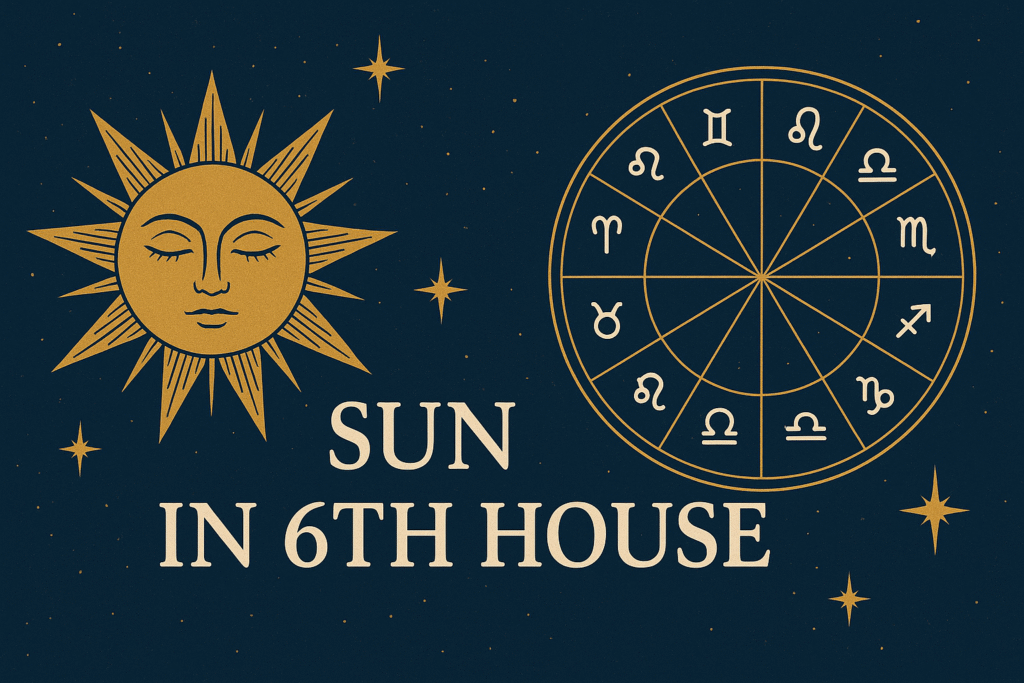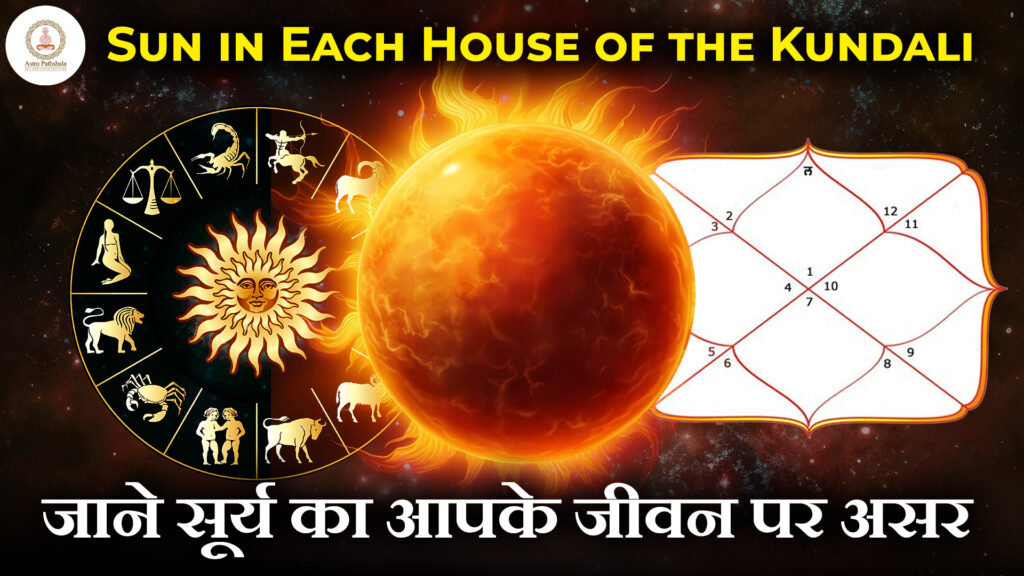In the vast mansion of destiny that Lal Kitab describes, every house has its own courtyard and walls echoing with karmic whispers. Its lamps burn with either light or shadows. When the Sun, the radiant king, enters the sixth house, it is like a fiery lamp in a chamber of battles and debts. Enemies may lurk in the corners. Health stands as guardian of one’s journey.
The sixth house in Lal Kitab is often seen as life’s battlefield. It holds obstacles and illnesses. Rivals arrive uninvited in this courtyard. Placing the Sun here is like sending a sovereign into the war tent: majestic yet vulnerable, glowing yet surrounded by dust and swords.
The sixth house concerns service, discipline, competition, and karmic duties. Here, the Sun cannot shine as freely as in the first or ninth house. Its brilliance must fight through smoke. Yet, the Sun’s presence turns the native into a warrior of destiny, facing trials with unwavering heart.

As the Brihat Parashara Hora Shastra reminds us:
“शत्रुहन्ता बलप्रदः सूर्यः षष्ठभावस्थः।”
“When the Sun resides in the sixth house, it destroys enemies and grants strength.”
This verse holds the essence of our journey today. Let us enter the sixth house with the Sun as our guide and explore its warmth, its trials, and the remedies prescribed by Lal Kitab.
House number six corresponds to Virgo. Its ruling planet is Mercury. Mercury generally maintains a neutral, quiet relationship with the Sun. This house is the permanent seat of Ketu, and Ketu moderates the Sun. Its influence here is significant.
At the same time, Rahu holds great strength in this house. According to Lal Kitab, Rahu can eclipse the Sun. Its effect must also be considered when the Sun is placed here. This creates a complex balance. Sun, Ketu, and Rahu all weave their energies into the karmic courtyard of the sixth house.
Importantly, this house sees the debilitation of both Ketu and Venus. Venus is an enemy of the Sun. Rahu also resides here in its supportive form. The Sun cannot expect much royal favour or blessings of courtly power. Yet Lal Kitab reminds us: the Sun will not yield wholly bad results in this house.
Instead, the Sun’s challenges here are specific. It may cause difficulties related to the maternal uncle’s family and women-related matters. Even these effects are mild, more like passing clouds than permanent storms. The Sun in the sixth may also bring problems in the feet. This reflects the earthy nature of this house.
The colour of this horoscope becomes earthy, and remedies connected to Mercury bring relief and balance. Since the sixth house also signifies grandchildren, the Sun here may play a role in the blessings or karmic lessons associated with future generations.
For remedies, Lal Kitab prescribes a symbolic act
To protect the maternal uncle’s family and reduce negativity, feed jaggery to a monkey. This harmonizes the Sun’s fire with the balancing influence of Mercury and Ketu.
During the Venus period (three years), the native may experience considerable pleasures and enjoyments. This is because Venus, though debilitated here, is weaker than the Sun and thus cannot fully dominate.
The Nature of the Sun
The Sun is not just a planet; it is the very soul of the horoscope. It is the king in the court of planets, the lamp of life whose rays awaken consciousness itself. In Lal Kitab, the Sun is compared to the glowing light in the centre of the courtyard; without it, the house falls into darkness. Wherever the Sun resides, it demands recognition, discipline, and a sense of royal responsibility.
In its natural state, the Sun is fiery, authoritative, paternal, and pure. It symbolises one’s Atma (soul), fatherly lineage, authority, and the burning will to rise above the ordinary. It is also the karmic lamp. It shows how much one has learned about ego, pride, and selflessness.
Yet, like a royal flame, the Sun can either illuminate or scorch. In friendly houses, it nourishes life. In enemy territories, it burns walls and dries treasuries. In the sixth house, its character becomes that of a warrior king. He is surrounded by rivals, tested by illness, challenged by debts, and still determined to uphold his throne.
Positive Effects
When the Sun is strong and well-placed in the sixth house, it is like a blazing lamp set in the war-room, giving light amidst chaos. Such natives often find themselves naturally courageous, determined, and capable of defeating enemies. Their aura itself unsettles rivals, as if the Sun burns the shadows that come too close.
The sixth house Sun makes one disciplined in habits, fearless in conflicts, and often victorious in legal or professional disputes. Just as a king earns loyalty by standing firm in battle, these individuals command respect in adversities. They rise from illnesses with renewed vitality, often defeating ailments through sheer willpower and inner fire.
In matters of service and work, the Sun here can shine beautifully. It bestows positions in administration, government, or fields where authority and discipline matter. Just as the Sun organises the rhythm of the universe by rising and setting, so does the native bring order where there is chaos.
Most importantly, the Sun in the sixth house often grants a hidden spiritual blessing: the ability to convert enemies into teachers. Life’s obstacles, instead of breaking them, polish their spirit like fire purifying gold.
Negative Effects
But what happens when the lamp of the Sun flickers in this chamber? A weak or afflicted Sun in the sixth house can cast troubling shadows.
The sixth house is already burdened with debts, illnesses, and enemies. If the Sun is weak here, the person may face ongoing health issues, especially related to digestion, eyes, or the heart. It is as if the Sun’s light is blocked, creating a sense of unease instead of comfort.
The Sun, when dim in this house, may spark conflicts with authority, father, government, or superiors. Ego clashes flare too wildly. Debts may multiply, and enemies may seize chances to weaken resolve.
In Lal Kitab’s symbolism, a weak Sun here is a lamp pressed to a damp wall: instead of warmth, it blackens the wall with soot. Such natives may also struggle with inner enemies—pride, anger, suspicion—which can be greater obstacles than outside rivals.
Thus, the sixth house Sun teaches us that the most significant battle is not with the outer world but with the shadows of our own mind.
Lal Kitab Symbolism
Lal Kitab’s poetic language makes the understanding of planets vivid and unforgettable. The Sun in the sixth house is the royal lamp burning in the room of service and struggle. Its flames illuminate debts, enemies, and illnesses. Sometimes they burn these away, sometimes they make them more visible than one would like.
The sixth house in Lal Kitab is like the treasury of karmic dues. Here are debts from past lives that come to collect payment. When the Sun enters, it lights up this treasury and reveals what one owes to others—whether in money, respect, or service.
It is also like the fire in the courtyard, where trials test one’s strength. A strong Sun makes this fire a sacred havan kund, burning away impurities. A weak Sun, however, may make the fire dangerous, leading to burns instead of purification.
The walls of the sixth house are important. If the Sun stands firm, these walls are strong and keep enemies out. If the Sun is weak, cracks appear. Adversaries then seep in like water through broken plaster.
Thus, the Sun here is both protector and challenger, demanding that the native learn humility, discipline, and the wisdom to convert battles into blessings.
Remedies
Lal Kitab is not merely about prediction. It is about healing. For the Sun in the sixth house, remedies are like polishing the royal lamp. They help its flame burn steadily and pure.
- Respect the Father and Authority – The Sun represents the father. Serving, honouring, and maintaining harmony with one’s father (or fatherly figures) strengthens the Sun’s blessings. Disrespect can cause the lamp to dim.
- Offer Water to the Rising Sun – Every morning, pour water to the Sun with devotion. It is like feeding oil to the lamp. This strengthens vitality and courage.
- Avoid Ego Battles – The sixth house is already a battlefield. Avoid unnecessary quarrels. Humility is the best shield.
- Donate Wheat and Copper – Offer wheat, jaggery, or copper articles to people in need. This brings balance to the fiery Sun. These items are symbolically connected to its energy.
- Keep the Courtyard Clean – Lal Kitab often emphasises the physical environment. Keep the kitchen, courtyard, and central door clean. This ensures the Sun’s light flows freely in life.
- Feed Cows or Offer Water to Them – The cow is sacred to the Sun’s energy. Kindness toward cows pacifies the harshness of the Sun in this house.
By following these remedies, the native keeps the lamp glowing, ensuring that the Sun in the sixth house becomes a source of strength rather than conflict.
Conclusion
The Sun in the sixth house of Lal Kitab is like a king walking into the battlefield of karma. It is not a placement of comfort but of courage, not of luxury but of discipline. Here, the soul is tested amidst debts, illnesses, and enemies. And yet, when the Sun shines brightly, it transforms these challenges into stepping stones, making the native a warrior of light.
The lesson of the sixth house Sun is simple yet profound. Life’s true glory lies not in avoiding battles but in fighting them with grace, humility, and wisdom. The lamp in the dark room does not only reveal the shadows; it also dispels them. So does the Sun in this house—revealing life’s struggles and burning them with its golden fire.
In the end, the sixth house Sun teaches us that every enemy is a disguised teacher, every illness a hidden guide, and every debt a reminder of the soul’s unfinished journeys. To serve, to discipline oneself, to shine humbly amidst trials, this is the true path of the Sun in the sixth house, as Lal Kitab reminds us with its timeless metaphors.
Sun in Trikon Houses – त्रिकोण भावों में सूर्य देगा ये फल
Sun in Each House of the Kundali – जाने सूर्य का आपके जीवन पर असर
Ketu in Sixth House: Defining Your Life’s Purpose and Destiny


